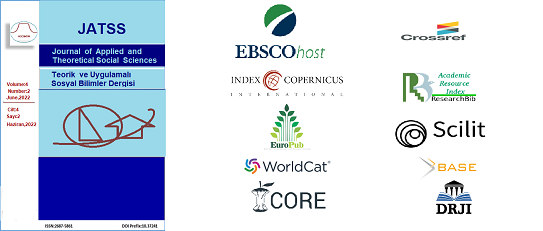Reassessing the Concept of Peace in the Concert of Europe: A European Model of Security Based upon Cooperation of States against People
Abstract
Concert of Europe was a system that was built for the purpose of maintaining the status quo between the European states and the means by which the system rested were constructed during the course of the Congress of Vienna. The Holy Alliance and the Quadruple Alliance (later Quintet) not only enabled Europe's Great Powers to cooperate in building and maintaining order, but also succeeded in creating common values that would keep cooperation alive.While the liberal and nationalist ideas brought by the French Revolution and spread by Napoleon's campaigns were alive both in European societies and on the political map drawn by Napoleon in 1815, the victorious major powers were aware that the peace was to be established both by the suppression of these ideas and by reformation of the map. For this reason, the absolutist values and structure before the French Revolution formed the reference points that would form the basis of the new peace.
This article aims to analyze the peace on which the so-called European Harmony is based, within the framework of international relations literature.
Metrics
References
Black, J. (1998), Napoleon’s Impact on IR, History Today, Vol 48, Issue 2, February 1988, 45-51.
Black, J.(1999), From Louis XIV to Napoleon, The Fate of a Great Power, London, UCLA Press.
Blanning, T.C.W. (1994), Paul Schroeder’s Concert of Europe, The International History Review, Vol. 16, No. 4 (Nov., 1994), 701-714. DOI: https://doi.org/10.1080/07075332.1994.9640692
Bull, H. (1978), The Anarchial Society, London, The McMillan Press Ltd. (2nd ed.).
Bridge, F.R. & Bullen, R. (1980), The Great Powers and the European System, London, Longman.
Chadwick, H. (1986), Augustine, A Very Short Introduction, Oxford, Oxford University Press.
Chapman, T. (1998), Congress of Vienna, London, Routledge.
Delfiner, H. A. (2003), Alexander I, The Holy Alliance and Clemens Metternich: A Reappraisal, East European Quarterly, Vol:37, No:2, 127-150.
Grab, A. (2008), Napoleon and the Transformation of Europe, New York, Palgrave.
Holbraad, C. (1971), The Concert of Europe, A Study in German and British International Theory, New York, Barnes and Noble.
Jervis, R. (1985), From Balance to Concert: A study of International Security Cooperation, World Politics, Vol. 38, No. 1. (Oct., 1985), 58-79. DOI: https://doi.org/10.2307/2010351
Lee, S. J.(1982), Aspects of European History,London, Routledge.
Levy, J. S. (1994), The Theoretical Foundations of Paul W. Schroeder's International System, The International History Review, Vol. 16, No. 4 (Nov., 1994), 715-744. DOI: https://doi.org/10.1080/07075332.1994.9640693
Ikenberry, J. (2001), After Victory, Princeton, Princeton University Press.
Kissinger, H. (1956),The Congress of Vienna: A Reappraisal, World Politics, Vol. 8, No. 2 (Jan., 1956), 264-280. DOI: https://doi.org/10.2307/2008974
Kissinger, H. (1957), A World Restored. London, Phoenix Press.
Mowatt R. B. (1922), A History of European Diplomacy 1815-1914, London, Edward Arnold & Co.
Rich, N. (1992), Great Power Diplomacy, New York, McGraw-Hill.
Richmond, O. P. (2008), Peace in International Relations, London, Routledge. DOI: https://doi.org/10.1177/03058298080360030401
Rosecrance, R. N. (2002), War and Peace, World Politics, Vol. 55, No. 1 (Oct., 2002), 137-166. DOI: https://doi.org/10.1353/wp.2003.0007
Seaman, L.C.B. (1955), From Vienna to Versailles, London, Methuen and Co. Ltd.
Schneid, F. C. (2008), Kings, Clients and Satellites in the Napoleonic Imperium, The Journal of Strategic Studies, Vol. 31, No. 4, 571 – 604, August 2008, 571-604. DOI: https://doi.org/10.1080/01402390802088432
Schroeder, P. W. (1989), The Nineteenth Century System: Balance of Power or Political Equilibrium?, Review of International Studies, Vol. 15, No. 2, Special Issue on the Balance of Power(Apr., 1989), 135-153. DOI: https://doi.org/10.1017/S0260210500112975
Schroeder, P.W. (1990), Napoleon's Foreign Policy: A Criminal Enterprise, The Journal of Military History, Vol. 54, No. 2 (Apr., 1990), 147-162. DOI: https://doi.org/10.2307/1986040
Schroeder, P. W. (1992), Did the Vienna Settlement Rest on a Balance of Power?, The American Historical Review, Vol. 97, No. 3 (Jun., 1992), 683-706. DOI: https://doi.org/10.2307/2164774
Schroeder, P. W. (Nov, 1994) Balance of Power and Political Equilibrium: A Response, The International History Review, Vol. 16, No. 4 (Nov. 1994), 745-754. DOI: https://doi.org/10.1080/07075332.1994.9640694
Schroeder, P. W. (1994), The Transformation of European Politics, Oxford, Oxford University Press.
Schroeder, P. W. (2001), A. J. P. Taylor's International System, The International History Review, XXIN. 1: March 2001, 1-27. DOI: https://doi.org/10.1080/07075332.2001.9640924
Taylor, A.J.P. (1953), The Struggle for Mastery in Europe 1848-1918, Oxford, Oxford University Press.






















